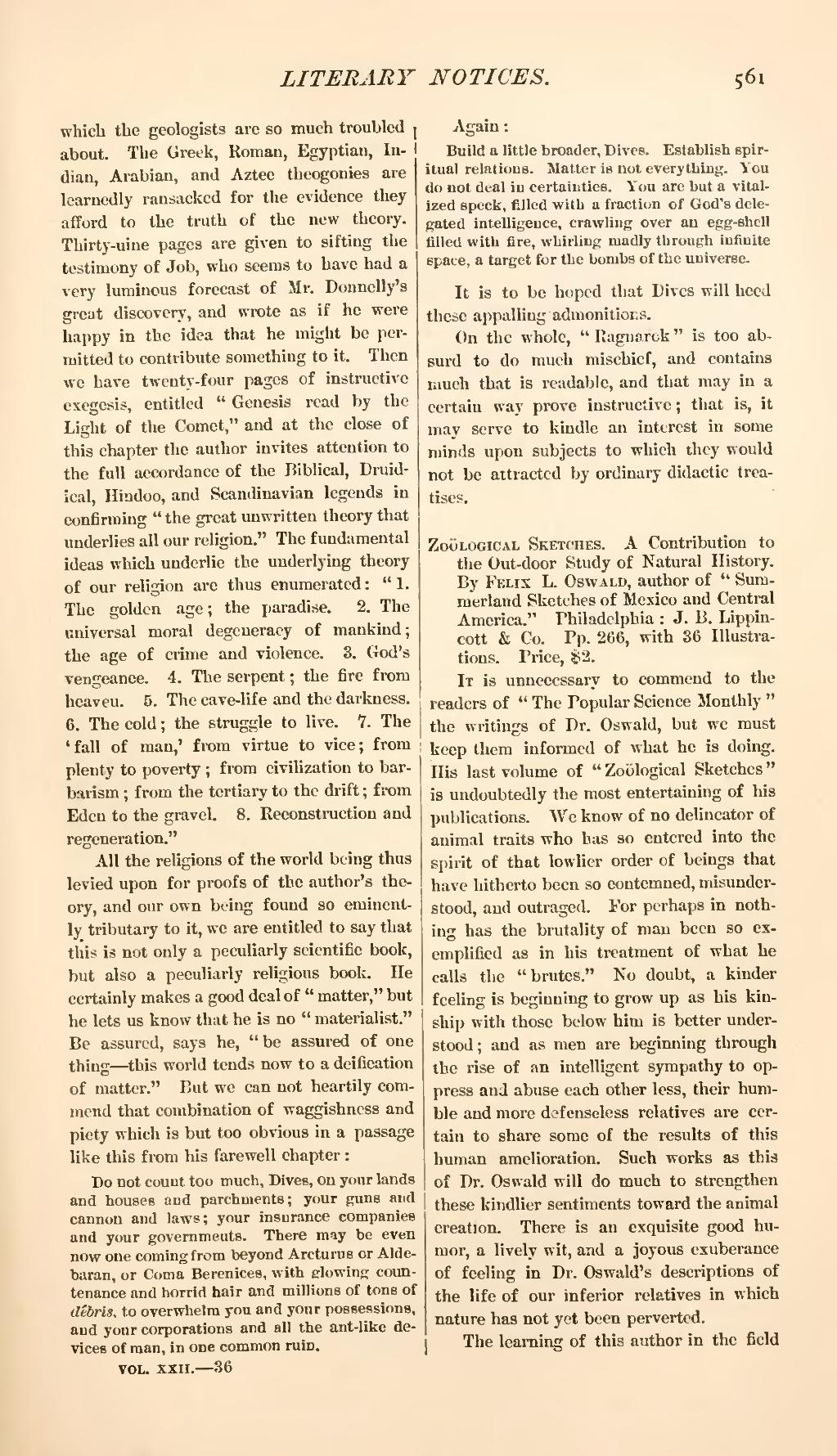which the geologists are so much troubled about. The Greek, Roman, Egyptian, Indian, Arabian, and Aztec theogonies are learnedly ransacked for the evidence they afford to the truth of the new theory. Thirty-nine pages are given to sifting the testimony of Job, who seems to have had a very luminous forecast of Mr. Donnelly's great discovery, and wrote as if he were happy in the idea that he might be permitted to contribute something to it. Then we have twenty-four pages of instructive exegesis, entitled "Genesis read by the Light of the Comet," and at the close of this chapter the author invites attention to the full accordance of the Biblical, Druidical, Hindoo, and Scandinavian legends in confirming "the great unwritten theory that underlies all our religion." The fundamental ideas which underlie the underlying theory of our religion are thus enumerated: "1. The golden age; the paradise. 2. The universal moral degeneracy of mankind; the age of crime and violence. 3. God's vengeance. 4. The serpent; the fire from heaven. 5. The cave-life and the darkness. 6. The cold; the struggle to live. 1. The 'fall of man,' from virtue to vice; from plenty to poverty; from civilization to barbarism; from the tertiary to the drift; from Eden to the gravel. 8. Reconstruction and regeneration."
All the religions of the world being thus levied upon for proofs of the author's theory, and our own being found so eminently tributary to it, we are entitled to say that this is not only a peculiarly scientific book, but also a peculiarly religious book. He certainly makes a good deal of "matter," but he lets us know that he is no "materialist." Be assured, says he, "be assured of one thing—this world tends now to a deification of matter." But we can not heartily commend that combination of waggishness and piety which is but too obvious in a passage like this from his farewell chapter:
Again:
It is to be hoped that Dives will heed these appalling admonitions.
On the whole, "Ragnarok" is too absurd to do much mischief, and contains much that is readable, and that may in a certain way prove instructive; that is, it may serve to kindle an interest in some minds upon subjects to which they would not be attracted by ordinary didactic treatises.
Zoölogical Sketches. A Contribution to the Out-door Study of Natural History. By Felix L. Oswald, author of "Summerland Sketches of Mexico and Central America." Philadelphia: J. B. Lippincott & Co. Pp. 266, with 36 Illustrations. Price, $2.
It is unnecessary to commend to the readers of "The Popular Science Monthly" the writings of Dr. Oswald, but we must keep them informed of what he is doing. His last volume of "Zoölogical Sketches" is undoubtedly the most entertaining of his publications. We know of no delineator of animal traits who has so entered into the spirit of that lowlier order of beings that have hitherto been so contemned, misunderstood, and outraged. For perhaps in nothing has the brutality of man been so exemplified as in his treatment of what he calls the "brutes." No doubt, a kinder feeling is beginning to grow up as his kinship with those below him is better understood; and as men are beginning through the rise of an intelligent sympathy to oppress and abuse each other less, their humble and more defenseless relatives are certain to share some of the results of this human amelioration. Such works as this of Dr. Oswald will do much to strengthen these kindlier sentiments toward the animal creation. There is an exquisite good humor, a lively wit, and a joyous exuberance of feeling in Dr. Oswald's descriptions of the life of our inferior relatives in which nature has not yet been perverted.
The learning of this author in the field

